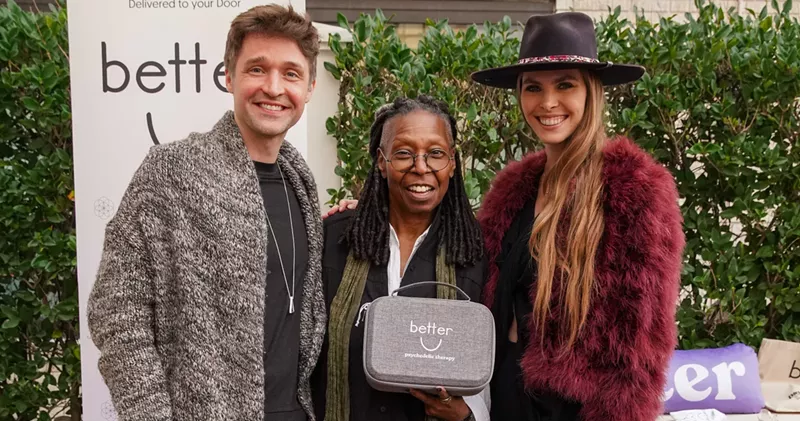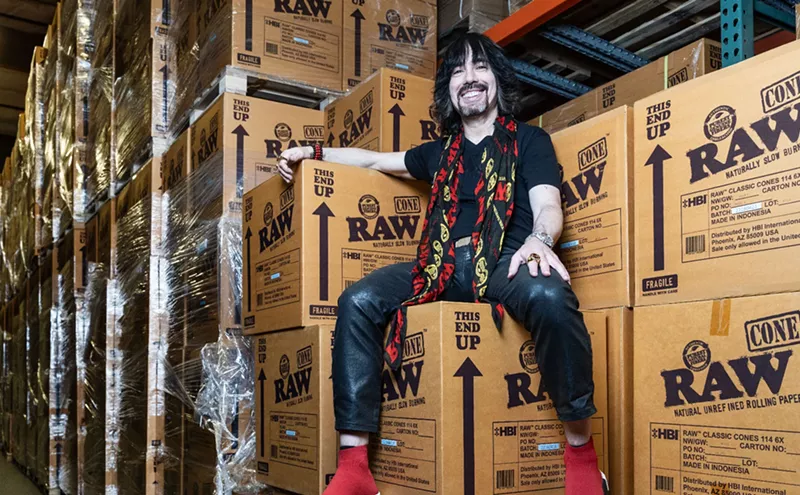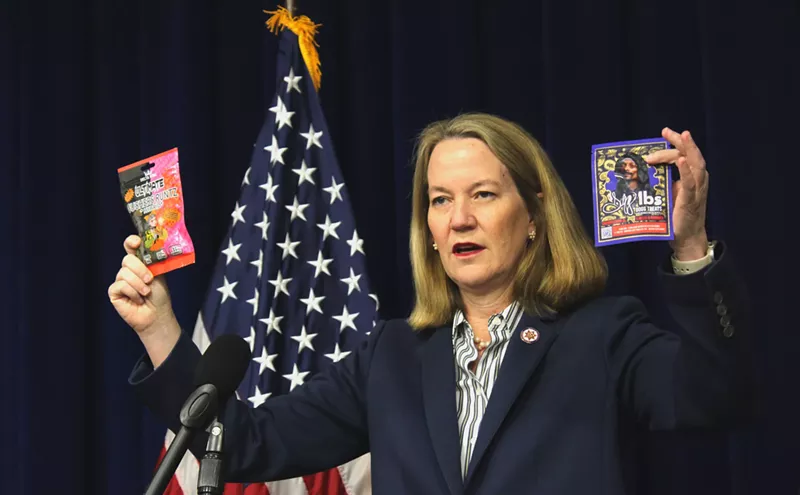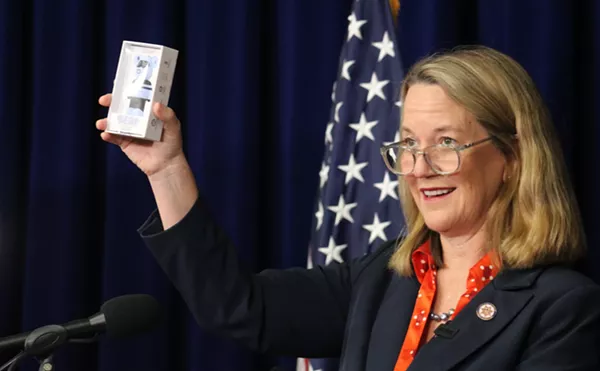There’s also a pack of ketamine lozenges.
If you’re familiar with ketamine, it might be due to its reputation as an illicit party drug. Or perhaps you’ve read about Elon Musk’s prodigious use of the substance. The general public is probably less aware of how ketamine is supposed to be used, according to the Food and Drug Administration: for pain relief and as an anesthetic.
Yet across Arizona, several companies are now using ketamine for a different purpose: to treat PTSD, depression and anxiety. More than that, though, these upstart companies are shipping this Schedule III controlled substance directly to people’s homes, where they can ingest it and go through a therapy session guided from afar by someone on a computer.
One of these companies is Better U, whose founder, Derek Du Chesne, pitches the at-home ketamine therapy wave as a tectonic shift for society. “This isn’t just the future of medicine,” he told Phoenix New Times in a Zoom interview. “This is the future of humanity.” He said ketamine therapy, which he sought after struggling with depression and suicidal ideation, “probably saved my life.”
At least one drug expert takes the diametrically opposite view. To Caleb Alexander, an epidemiologist at Johns Hopkins University's Bloomberg School of Public Health, at-home ketamine therapy “is a horrible idea,” one that plays far too fast and loose with an “incredibly potent drug.”
“It’s too bad that our legal and regulatory system is apparently allowing for this to happen,” said Alexander, who is also the co-director of the Center for Drug Safety and Effectiveness at the university. “There’s a reason it’s a controlled substance.”
Yet happening it is, and via more companies than just Better U.
Since the onset of the COVID-19 pandemic, at-home ketamine treatment has become a growing industry. Du Chesne founded Better U in California in 2021, expanding service to Arizona a year later. The company now operates in 35 states and serves 15,000 patients, Du Chesne said. A quick Google search will lead customers to the glossy websites of several other companies offering similar at-home services in the state, such as Mindbloom, Nue Life, Wondermed and KetaMD.
Using ketamine to treat mental health conditions is a relatively recent trend, along the lines of similar efforts to use psilocybin mushrooms and ibogaine for the same purpose. But Alexander said no one really knows whether these ketamine products actually work. The drug has “not been studied for many of these conditions,” he added, “and even when they have been studied, the evidence is murky.”
Taking those treatments out of a clinical setting and having them happen in the home only increases Alexander’s concern. When New Times reached out to ask for an interview on the subject, he replied that at-home ketamine therapy “sounds like a terrible idea.”
How at-home ketamine therapy works
Yet Du Chesne and Better U’s chief medical officer, Dr. Zaid Fadul, rave about the benefits of their product.Fadul, who operates a separate practice in Scottsdale, said ketamine helps patients “approach really intensely emotional experiences without the emotion,” allowing them “to really start wrapping your brain around and process things.” He said many Better U patients are dismayed by the ineffectiveness of other treatments. “They’ve seen multiple psychiatrists, they’re done behavioral therapy, they’ve exhausted the health care system,” Fadul said.
Here’s how a Better U ketamine treatment works. Before anything is mailed, Fadul said, patients consult with the company’s “highly trained clinicians” to ensure they are a good candidate for the treatment. High blood pressure, alcoholism, liver issues and certain psychiatric and neurological issues may disqualify someone.
Once accepted, patients begin treatment at what Better U says is a very low dose. During four to eight sessions, patients complete a variety of online modules through a “member portal” that works like a playlist. The modules aim to strengthen the patients’ self-love and motivation, while specialized modules are used for veterans dealing with trauma and people coping with grief, sexual trauma or relationships.
Throughout treatment sessions, patients also have access to an online “professional, certified coach or therapist” to help them “unpack their experiences” and “set goals for what they want out of their treatments,” Du Chesne said. They are also required to have “peer support” during their sessions — basically, you can’t be home alone.
Du Chesne claims Better U “provides a safe at-home experience” that’s “incredibly well-researched,” adding that only 0.1% of the company’s patients have experienced what Fadul called "serious or catastrophic events." Some 5-10% of patients experience "benign reactions such as nausea," Fadul said, and the company "routinely prescribe(s) Zofran and advise(s) patients to fast for three to four hours prior to treatment, as well as provide clear instructions on medication administration."
Alexander was skeptical of Better U's claims. "They’re clearly not looking carefully to identify and systematically track adverse events,” he said. Presented with Alexander's comments, Fadul said in an email that "we track and address all reported reactions, both mild and severe, and are committed to transparency and patient safety."
Though Fadul said the company provides clear instructions on medication administration, Alexander also worries that “there’s always potential for non-medical use” without a clinician to keep eyes on patients while they’re under the effect of the drug. In the comfort of their own homes, patients could “inadvertently or intentionally” combine ketamine with other substances, such as alcohol, opioids and other prescription drugs. Alexander said those interactions could be extremely risky.
“It’s foolish to think that this riskier drug can be used safely in home settings routinely without direct clinical supervision,” Alexander said. “Dubious at best.”
In response, Fadul said in an email: "Xanax is even more controlled (schedule II) and is prescribed with significantly more abuse, dependence and side effect potential, and people have been taking it unmonitored at home for decades.”
The legality of at-home ketamine therapy
But is it legal, though? It’s apparently not illegal.The FDA has not approved ketamine to be used in the way that Better U and other companies market it. Additionally, the Drug Enforcement Administration is currently reviewing its rules on telehealth prescribing of controlled substances. But medicines are used off-label all the time, in concert with a prescribing doctor, which is what Better U and other companies are doing in Arizona and elsewhere.
Better U does not have a physical location in Arizona yet, though it’s aiming to open a wellness center here by the end of the year. However, its clinicians are individually licensed to practice medicine in Arizona by “the relevant state licensing boards,” Better U spokesperson Tad Hamilton said in a statement. As a telehealth company, Hamilton said Better U itself is not required to be licensed or registered with the Arizona Department of Health Services, “since our clinicians are already individually licensed and we provide only virtual care.”
Because ketamine is prescribed off-label, most insurance plans won’t cover Better U’s treatments. Du Chesne has worked to make the price accessible, lowering what was once a $1,500-per-session price tag when he was in ketamine therapy to between $88 to $100 a session. Companies like WonderMed, Joyous and MindBloom advertise similar pricing. But Alexander is concerned that the low price point will cause “additional people to seek” the drug.
The at-home, telehealth nature of it is partly what keeps the cost down, though Du Chesne touts other benefits. When patients come out of a session at a ketamine clinic, they have to immediately go into what Du Chesne calls “executive mode” to figure out how to get home or what to do next. “You may be emotionally vulnerable,” Du Chesne said. “You don’t want to sit in an Uber or sit in a waiting room with other people for an hour.”
At home, patients can “relax,” Fadul said. “(At-home ketamine therapy) dramatically improves access to care, and you also have a better kind of emotional footprint that you’re stepping into, which allows you to do the work.”
Alexander rejects that idea. Whether there is some benefit to ketamine therapy or not — and future studies may indeed prove a positive effect — ketamine is a powerful drug that he says should be strictly controlled.
“There are thousands of medical procedures that are done in monitored settings, and for good reason,” Alexander said. “This should be one of them.”














